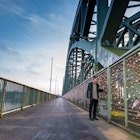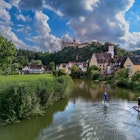
Dec 17, 2024 тЂ 15 min read

Oct 31, 2019 тЂ 5 min read

Food plays a huge part in the Advent traditions. FamVeld / Getty Images
December in Germany has always been an important time and for visitors it's the perfect month to experience centuries-old Christmas traditions that are still alive today.
Historically, Advent is meant to be a period of time for preparing for the Christmas religious holiday and runs from the start of December until Christmas Eve. Nowadays, it's a time to get together with friends and family - Deutsche GemУМtlichkeit (German coziness or hygge). Candles are lit, Christmas decorations set up and homes fill with the smell of cinnamon and freshly baked cookies.
You can start feeling the Advent atmosphere in mid-November; people start spending more time inside, slowly enveloping themselves and their homes in wintery magic. Families and friends get together to sing Christmas songs, for baking sessions, for dinner or just simply spend time with each other - things there was not enough time for throughout the busy year.
Life slows down and the whole country dives into the holiday anticipation mood. Travelling to Germany in December is a great way to see the country in a festive mood and experience a fairytale-like atmosphere. Because it's such a popular time to visit, itтs better to book and plan all activities in advance.
Read more: Germany for first-timers
At the end of November farmers markets start selling тAdventskranzт т a wreath traditionally made of evergreens and topped with four candles. One additional candle will be lit each Sunday until all four burn together before Christmas Eve. Lots of families create the wreath themselves but you can find them at the weekly farmerтs market in most German cities. More modern wreaths bought at department stores or small design shops are designed to last years.

Around this time, Christmas markets open in the heart of most cities and villages, while larger destinations can have markets in every district. Among the little huts selling food and goods, GlУМhwein (mulled wine), roasted caramelized almonds and Reibekuchen (potato fritters) with applesauce are the most popular treats. Crafts like bees-wax candles, wooden carved figurines or Christmas tree decorations made of paper or glass are everywhere; perfect for a beautiful souvenir.
Among the most well-known Christmas markets are Nuremberg, Dresden and Aachen but for a real fairytale atmosphere, try markets at smaller cities like Rothenburg ob der Tauber or the villages of the Black Forest. Mountainous regions like in the south of Germany also have a higher chance of snow in December.
Read more: 8 Christmas traditions from around the world
Every bakery decorates and sells Christmas cookies - Gingerbread, Lebkuchen and WeihnachstgebУЄck - and a great gift to bring home. Another great sweet treat is a Weihnachtsstollen - a cake-like sweet bread with raisins, dried apricots, marzipan and nuts covered in a cloud of sugar powder.
On 6 December is the celebration of Saint Nikolaus т not to be confused with Santa Claus. The evening before, you'll see children polishing their boots and placing them outside their door because Nikolaus is on his way. Overnight the shoes of well-behaved kids will be filled with nuts, oranges and chocolates while those misbehaving would only receive a тRuteт (twig).
If you travel with kids, tell them about the tradition and encourage them to place their shoes outside your hotel door. Some hotels and B&Bs enjoy playing along and provide little surprises for their young guests. If not, you can always become Nikolaus yourself.
Advent time comes to an end with the beginning of the Christmas holidays. Christmas Eve is when a lot of families gather together for dinner and go to church. Afterwards there are presents stashed under the decorated Christmas tree. 25 and 26 December are national holidays when everyday life comes to a complete halt and are reserved for family visits and reuniting with close friends.
With Christmas markets all over the city and beautiful decorations, spend an entire weekend exploring, combining first-class shopping, traditional Bavarian food, and stop-overs for a cup of mulled wine and sweet treats. Munich has a high chance of snow in December and the crispy air in the evenings make a stroll through the city even cosier.

A student city with a long history dating back to the Charles the Great, its beautiful old town is worth a visit any time of the year but is especially charming around Christmas. The old town is packed with narrow streets smelling of freshly baked Aachener Printen (a sort of gingerbread cookie) and Katschhof and the Market Square are filled with Christmas huts. It makes a great day visit from Cologne or ЖйУМВѕВѕБ№БєЛхДЧАљДк.
Read more: Traditional Christmas desserts from around the world (and where to try them)
Bremen old city and the Schnoorviertel are beautifully lit and decorated and the statue of the famous Bremen Town Musicians from the Brothers Grimm tales will spice up your photos. You'll find a lot of fish dishes at these Christmas markets and it's a great way to see how Advent is observed in northern Germany. Bremen is not as busy as neighbouring Hamburg but has enough activities to keep you busy during a weekend.
For Christmas vibes in a little village with a gorgeous set up in the Eifel mountains and most-likely snowy surroundings, Monschau is a good choice. The village is touristy but don't let that put you off.

With KУЖlner Dom standing above the city and a lively Christmas market at its feet, the view alone will impress any visitor. But Cologne has not only one, but several Christmas markets around the city. It gets very busy during December and you can spend an entire weekend shopping for unique presents or drinking coffee with Christmas baked goods in one of the trendy coffee shops in the Belgian Quarter and KУЖln Ehrenfeld. Also try the market located at the Rhein river next to the Schokoladenmuseum.


Dec 17, 2024 тЂ 15 min read



Dec 4, 2024 тЂ 4 min read




Nov 7, 2024 тЂ 6 min read
